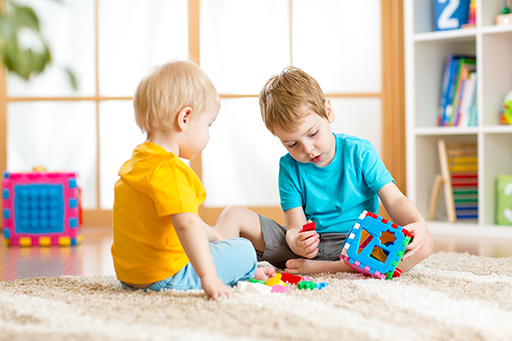2.1 Years 0–2
The adults in children’s lives can play a vital role in ensuring they all become confident and competent movers.

By actively supporting their movement, children’s language and communication skills may also be further developed. In Audio 3, Julia explains the importance of developmental reviews and how services may support families.
Transcript: Audio 3
From 0–2 years is a really critical time for children’s physical development as all the essential foundation or fundamental movement skills are learned and practised.
Being able to learn and rehearse physical skills in an unhurried and supportive environment is vital and ensures that children can experience movement transitions – like from tummy-time to rolling to crawling to walking – without any stress or pressure to perform or reach any expected ‘milestone.’
It is also important to recognise that every child follows a unique inner timetable and skills are acquired when they are ready. Remember there are many ways to the top of the mountain, but the view remains the same!
Activity 3
Read the case study about a stay-at-home father below and then answer the questions that follow.
Case study: Tim
Tim is a stay-at-home, young dad with 20-month-old twins – a boy and a girl, Adam and Beth. He has noticed a big difference in the twins’ physical development. Adam has been walking for 8 months already and is continually active. Beth is in the early stages of walking and prefers to sit and play.
He is finding it difficult to provide active opportunities that suit both children and is worried what will happen during their review as his daughter seems so behind her brother.
What questions could you ask Tim to get more information about the twins’ physical development?
What would you say to Tim that may reassure him about Beth’s physical development?
Discussion
First of all, it’s important to reassure Tim that walking has the widest age range for a physical skill, and can vary from 10–20 months, with an average of 12–14 months (Manners, 2019). Children, even twins, do develop at different rates.
You may want to ask Tim if he can provide play opportunities for Beth that will help her to walk, but it’s important not to push Beth, gently encouraging her may help to build her confidence.
Beth’s play interests may mean that she is more likely to sit and play. As long as she is given gentle encouragement and opportunities to walk, it is likely that she will start to do so. If Beth doesn’t make progress, Tim may want to speak with the Health Visitor.
